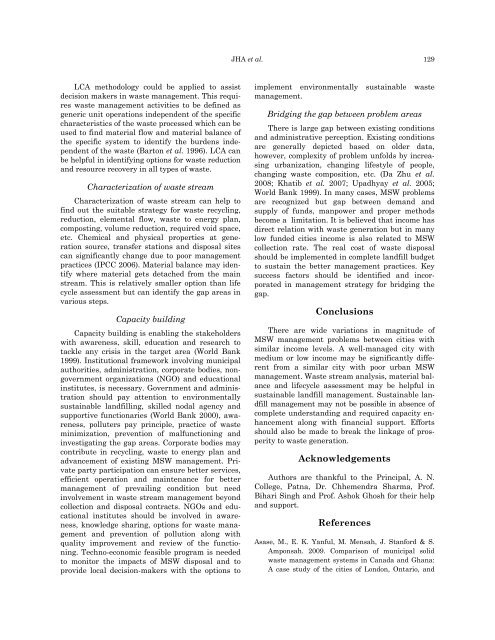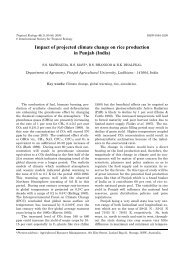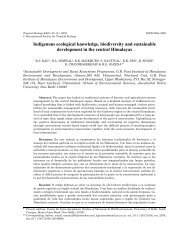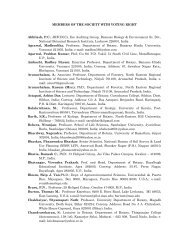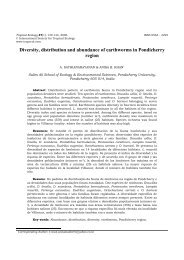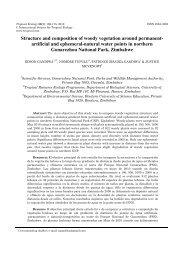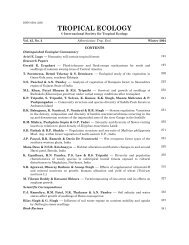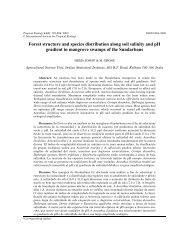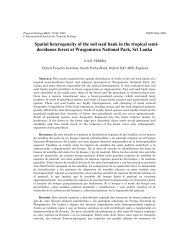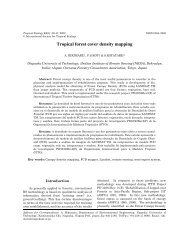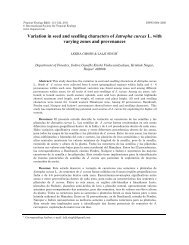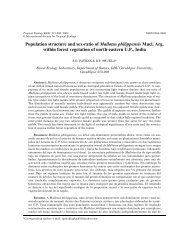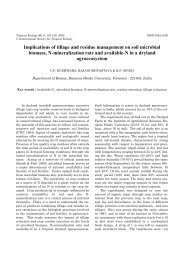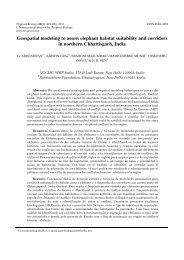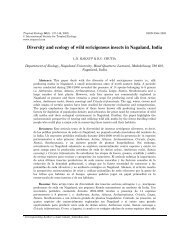Sustainable municipal solid waste management in ... - ResearchGate
Sustainable municipal solid waste management in ... - ResearchGate
Sustainable municipal solid waste management in ... - ResearchGate
Create successful ePaper yourself
Turn your PDF publications into a flip-book with our unique Google optimized e-Paper software.
JHA et al. 129<br />
LCA methodology could be applied to assist<br />
decision makers <strong>in</strong> <strong>waste</strong> <strong>management</strong>. This requires<br />
<strong>waste</strong> <strong>management</strong> activities to be def<strong>in</strong>ed as<br />
generic unit operations <strong>in</strong>dependent of the specific<br />
characteristics of the <strong>waste</strong> processed which can be<br />
used to f<strong>in</strong>d material flow and material balance of<br />
the specific system to identify the burdens <strong>in</strong>dependent<br />
of the <strong>waste</strong> (Barton et al. 1996). LCA can<br />
be helpful <strong>in</strong> identify<strong>in</strong>g options for <strong>waste</strong> reduction<br />
and resource recovery <strong>in</strong> all types of <strong>waste</strong>.<br />
Characterization of <strong>waste</strong> stream<br />
Characterization of <strong>waste</strong> stream can help to<br />
f<strong>in</strong>d out the suitable strategy for <strong>waste</strong> recycl<strong>in</strong>g,<br />
reduction, elemental flow, <strong>waste</strong> to energy plan,<br />
compost<strong>in</strong>g, volume reduction, required void space,<br />
etc. Chemical and physical properties at generation<br />
source, transfer stations and disposal sites<br />
can significantly change due to poor <strong>management</strong><br />
practices (IPCC 2006). Material balance may identify<br />
where material gets detached from the ma<strong>in</strong><br />
stream. This is relatively smaller option than life<br />
cycle assessment but can identify the gap areas <strong>in</strong><br />
various steps.<br />
Capacity build<strong>in</strong>g<br />
Capacity build<strong>in</strong>g is enabl<strong>in</strong>g the stakeholders<br />
with awareness, skill, education and research to<br />
tackle any crisis <strong>in</strong> the target area (World Bank<br />
1999). Institutional framework <strong>in</strong>volv<strong>in</strong>g <strong>municipal</strong><br />
authorities, adm<strong>in</strong>istration, corporate bodies, nongovernment<br />
organizations (NGO) and educational<br />
<strong>in</strong>stitutes, is necessary. Government and adm<strong>in</strong>istration<br />
should pay attention to environmentally<br />
susta<strong>in</strong>able landfill<strong>in</strong>g, skilled nodal agency and<br />
supportive functionaries (World Bank 2000), awareness,<br />
polluters pay pr<strong>in</strong>ciple, practice of <strong>waste</strong><br />
m<strong>in</strong>imization, prevention of malfunction<strong>in</strong>g and<br />
<strong>in</strong>vestigat<strong>in</strong>g the gap areas. Corporate bodies may<br />
contribute <strong>in</strong> recycl<strong>in</strong>g, <strong>waste</strong> to energy plan and<br />
advancement of exist<strong>in</strong>g MSW <strong>management</strong>. Private<br />
party participation can ensure better services,<br />
efficient operation and ma<strong>in</strong>tenance for better<br />
<strong>management</strong> of prevail<strong>in</strong>g condition but need<br />
<strong>in</strong>volvement <strong>in</strong> <strong>waste</strong> stream <strong>management</strong> beyond<br />
collection and disposal contracts. NGOs and educational<br />
<strong>in</strong>stitutes should be <strong>in</strong>volved <strong>in</strong> awareness,<br />
knowledge shar<strong>in</strong>g, options for <strong>waste</strong> <strong>management</strong><br />
and prevention of pollution along with<br />
quality improvement and review of the function<strong>in</strong>g.<br />
Techno-economic feasible program is needed<br />
to monitor the impacts of MSW disposal and to<br />
provide local decision-makers with the options to<br />
implement environmentally susta<strong>in</strong>able <strong>waste</strong><br />
<strong>management</strong>.<br />
Bridg<strong>in</strong>g the gap between problem areas<br />
There is large gap between exist<strong>in</strong>g conditions<br />
and adm<strong>in</strong>istrative perception. Exist<strong>in</strong>g conditions<br />
are generally depicted based on older data,<br />
however, complexity of problem unfolds by <strong>in</strong>creas<strong>in</strong>g<br />
urbanization, chang<strong>in</strong>g lifestyle of people,<br />
chang<strong>in</strong>g <strong>waste</strong> composition, etc. (Da Zhu et al.<br />
2008; Khatib et al. 2007; Upadhyay et al. 2005;<br />
World Bank 1999). In many cases, MSW problems<br />
are recognized but gap between demand and<br />
supply of funds, manpower and proper methods<br />
become a limitation. It is believed that <strong>in</strong>come has<br />
direct relation with <strong>waste</strong> generation but <strong>in</strong> many<br />
low funded cities <strong>in</strong>come is also related to MSW<br />
collection rate. The real cost of <strong>waste</strong> disposal<br />
should be implemented <strong>in</strong> complete landfill budget<br />
to susta<strong>in</strong> the better <strong>management</strong> practices. Key<br />
success factors should be identified and <strong>in</strong>corporated<br />
<strong>in</strong> <strong>management</strong> strategy for bridg<strong>in</strong>g the<br />
gap.<br />
Conclusions<br />
There are wide variations <strong>in</strong> magnitude of<br />
MSW <strong>management</strong> problems between cities with<br />
similar <strong>in</strong>come levels. A well-managed city with<br />
medium or low <strong>in</strong>come may be significantly different<br />
from a similar city with poor urban MSW<br />
<strong>management</strong>. Waste stream analysis, material balance<br />
and lifecycle assessment may be helpful <strong>in</strong><br />
susta<strong>in</strong>able landfill <strong>management</strong>. <strong>Susta<strong>in</strong>able</strong> landfill<br />
<strong>management</strong> may not be possible <strong>in</strong> absence of<br />
complete understand<strong>in</strong>g and required capacity enhancement<br />
along with f<strong>in</strong>ancial support. Efforts<br />
should also be made to break the l<strong>in</strong>kage of prosperity<br />
to <strong>waste</strong> generation.<br />
Acknowledgements<br />
Authors are thankful to the Pr<strong>in</strong>cipal, A. N.<br />
College, Patna, Dr. Chhemendra Sharma, Prof.<br />
Bihari S<strong>in</strong>gh and Prof. Ashok Ghosh for their help<br />
and support.<br />
References<br />
Asase, M., E. K. Yanful, M. Mensah, J. Stanford & S.<br />
Amponsah. 2009. Comparison of <strong>municipal</strong> <strong>solid</strong><br />
<strong>waste</strong> <strong>management</strong> systems <strong>in</strong> Canada and Ghana:<br />
A case study of the cities of London, Ontario, and


